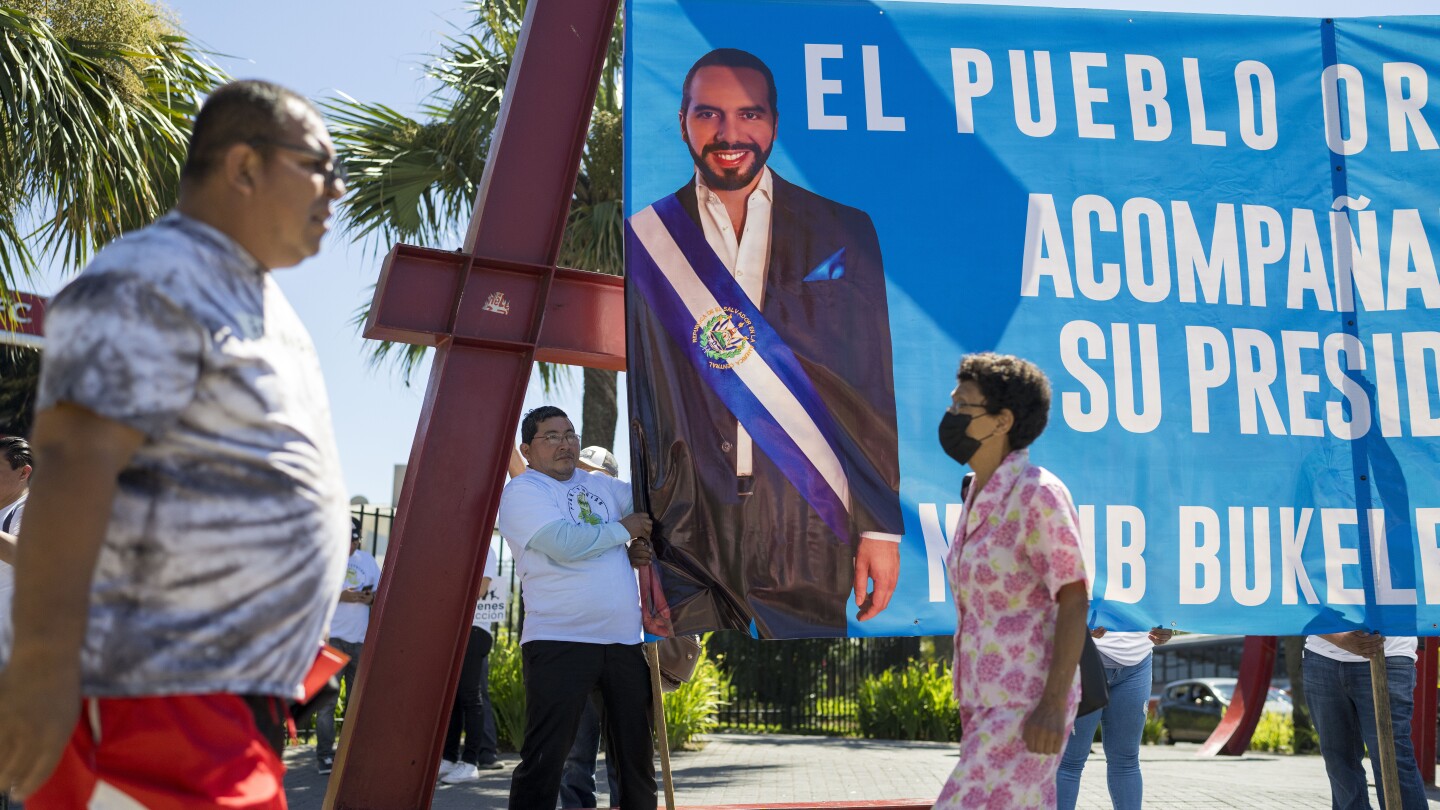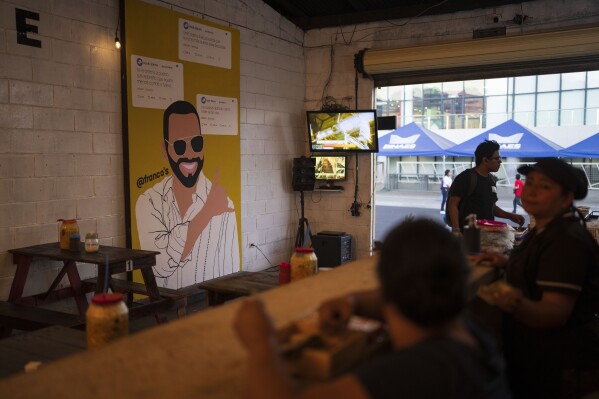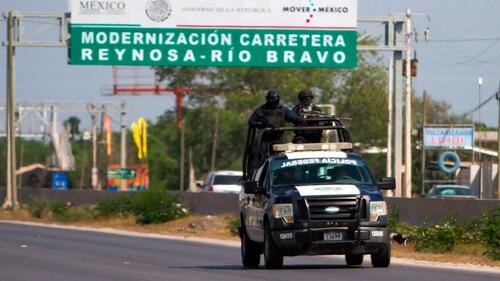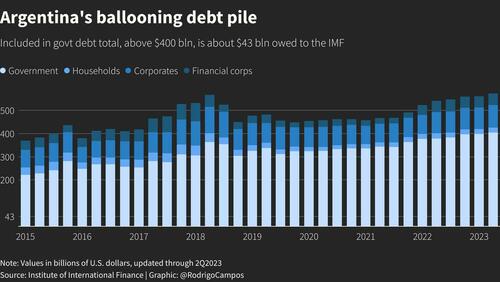Plain Jane
Just Plain Jane
January thread:
 www.timebomb2000.com
www.timebomb2000.com

 apnews.com
apnews.com

Supporters of El Salvador President Nayib Bukele campaign for his re-election outside a shopping mall in San Salvador, El Salvador, Wednesday, Jan. 31, 2024. El Salvador will hold a presidential election on Feb. 4. (AP Photo/Moises Castillo)
MEGAN JANETSKY
Updated 12:00 AM EST, February 1, 2024
Share
SAN SALVADOR (AP) — Love him or hate him, all eyes are on Nayib Bukele.
To many, El Salvador’s president is a national hero who took on the country’s violent gangs with an unrelenting hand. To others, the populist is a 21st century autocrat who has committed mass human rights abuses and has altered the rules of the game to concentrate power in his own hands.
Bukele has captured the world’s attention in a way few other Latin American leaders have in recent times.
The self-described “world’s coolest dictator” is likely to easily skate into a second presidential term in the election Sunday. After sidestepping El Salvador’s constitution prohibiting reelection in six different places, Bukele has the support of from seven to nine of every 10 voters, according to recent polling.

Patrons sit at a food store decorated with a mural of El Salvador President Nayib Bukele, who is running for re-election, in downtown San Salvador, El Salvador, Monday, Jan. 29, 2024. (AP Photo/Moises Castillo)
Read More
Alex Cisneros is among those who plan to vote for Bukele, many saying they have few options after years of corruption and violence under El Salvador’s traditional parties.
“He’s done many good things and many bad things,” said Cisneros, 32. “People criticize him, but he’s at least changed something.”
Growing up in one of the most dangerous areas of San Salvador, Cisneros fled to the U.S. when he was 20 after his cousin was slain by the Mara Salvatrucha gang. Now back home, he says he was disturbed when police jailed an elderly neighbor for protecting her son, a likely gang member, but he adds he can walk the streets freely at night for the first time in his life.
Bukele’s almost certain victory will further cement his grip on power as his tough tactics ripple out from this small Central American nation to other places with their own security crises like Ecuador, Honduras and the Dominican Republic. That worries rights advocates across the region.
Tyler Mattiace, Americas researcher at Human Rights Watch, considers Bukele “one of the biggest risks for human rights and for democracy that we see in Latin America right now.”
“Bukele is incredibly popular, not only at home in El Salvador,” Mattiace said. “We see a growing number of people in countries across Latin America who are supporting this kind of authoritarian populism because they believe that it could be the only way to address rising levels of violence.”
When he was first elected in 2019, Bukele, a former publicity manager of Palestinian descent, became Latin America’s youngest leader. Fond of spectacle, he has attracted some of the world’s biggest names, recently hosting the Miss Universe pageant and pulling in soccer star Lionel Messi to play a pre-season match.
But his rise to wide recognition came in 2022 with his harsh war on the gangs that had long terrorized El Salvador.
Under a state of emergency, his government has locked up 76,000 people — more than 1% of the population — in prisons where rights groups have documented cases of torture and the deaths of more than 150 inmates. The government also has been accused of systematic human rights abuses.
In an interview with The Associated Press on Tuesday, Bukele’s vice presidential running mate, Félix Ulloa, acknowledged the government “made mistakes” in detaining thousands of people who had committed no crimes. He also conceded officials may have set arrest quotas.
But he denied the government has suspended the rights of “honorable” Salvadorans. He justified the crackdown as being for the greater good of the country and widely popular.
“This is not a police state, it’s a state that provides security,” Ulloa said.
El Salvador’s homicide rate has shriveled to among the lowest in the Americas, when just a few years ago the country was deemed one of the most dangerous places in the world.
In fulfilling his promise to bring security, something the country’s two traditional parties failed at, Bukele has gained the adoration of millions of Salvadorans like Paola Ventura.
The shop where the 25-year-old works in downtown San Salvador is plastered with the president’s face, on hats and soccer jerseys reading “Bukele 2024.” It also once stocked Bukele scarves and blankets, but they were all bought up by customers visiting from other countries.
ADVERTISEMENT
Ventura said her boss also painted an entire wall of his nearby pupusa restaurant with a mural of Bukele, which has drawn in customers.
“He’s famous,” she said. “Bukele’s face sells.”
Others told AP they were too scared to talk about the election because of the mass detentions.
Bukele has pinned his campaign on the gang crackdown, warning Salvadorans that if his New Ideas party doesn’t win the election, the “war with the gangs would be put at risk.”
“The opposition will be able to achieve its true and only plan, to free the gang members and use them to return to power,” he said in one video as his message is spread widely on television, radio and social media.
Less visible to voters are the long-term democratic risks that come with the charismatic leader, constitutional lawyers, analysts and opposition politicians say.
As Bukele has grown more popular, he and his party have concentrated control over every branch of El Salvador’s government.
In 2020, Bukele entered the Legislative Assembly with soldiers after lawmakers balked at approving a security loan proposal. He clashed repeatedly with the then opposition-controlled congress during the pandemic when he tried to impose some of the regions toughest restrictions and lawmakers refused to grant him emergency powers.
When his party romped to victory in 2021 legislative elections, the newly elected congress purged the country’s constitutional court, replacing judges with loyalists who later ruled that Bukele could run for a second term despite the constitutional ban on reelection.
Bukele recently made electoral changes, slashing the number of municipalities in a way that analysts say further stacks the odds in his favor, particularly in congressional and local elections to be held in March.
The president has built a sophisticated communication machine pumping out highly produced government propaganda while his government has harassed journalists, political opponents and critics.
“These cumulative actions, the reforms, they’re part of a strategy. The idea is to have complete political control … and make any opposition basically null,” said Oscar Picardo, director of investigations at El Salvador’s Universidad Francisco Gavidia.
Bukele’s running mate denies the government has made any undemocratic moves to consolidate power. “There is nothing that we have done that does not have a legal foundation,” Ulloa told AP on Tuesday.
Seeing Bukele’s soaring popularity, some leaders in the region have turned to “The Bukele Model” for solutions to their own security crises.
In neighboring Honduras, following a brutal prison massacre by gangs, the government rounded up gangsters and vowed it would lock them up on a remote island prison.
With Haiti beset with a growing security crisis, in the neighboring Dominican Republic, highly popular leader Luis Abinader has increasingly mirrored Bukele’s discourse while pushing his own “fight against crime.”
As Ecuador staggers from a surge of violent crime, new President Daniel Noboa has annouced a crackdown on multiplying gangs, with dramatic scenes of police raids similar to the early days of Bukele’s state of emergency.
Bukele may be popular at home and abroad, but some Salvadorans feel he has spent too much time focused on his global image, and not enough on the country’s core problems like poverty, which has pushed Salvadorans to migrate for generations.
Despite efforts to project prosperity — adopting Bitcoin as an official currency and hosting a slew of international events — economic growth in El Salvador has largely stalled while inflation has jumped globally. Around half of Salvadorans faced food insecurity in 2023.
Julio Eduardo Durán, 57, has spent 40 years selling and fixing watches and has seen his earnings plummet since the government kicked walking vendors out of the capital’s main plaza in an effort to clean up the area.
“They’ve forgotten the poor,” Durán said. “Our government doesn’t help us at all, it’s all a lie. They want El Salvador to be like the United States, but we’re going hungry.”
Durán would not say how he would vote on Sunday’s election.
INTL - Latin America and the Islands: Politics, Economics, Military - January 2024
December 2023 thread: https://www.timebomb2000.com/xf/index.php?threads/latin-america-and-the-islands-politics-economics-military-december-2023.640440/#post-9991568 https://apnews.com/article/venezuela-guyana-british-ship-essequibo-6eb48713a2d6b8716a2c6a836ad93361 Venezuela says troops will...
El Salvador's Bukele has everyone's attention as he seeks reelection in spite of the constitution
To many, El Salvador President Nayib Bukele is a national hero who took on the country’s violent gangs with an unrelenting hand.
El Salvador’s Bukele has everyone’s attention as he seeks reelection in spite of the constitution
Supporters of El Salvador President Nayib Bukele campaign for his re-election outside a shopping mall in San Salvador, El Salvador, Wednesday, Jan. 31, 2024. El Salvador will hold a presidential election on Feb. 4. (AP Photo/Moises Castillo)
MEGAN JANETSKY
Updated 12:00 AM EST, February 1, 2024
Share
SAN SALVADOR (AP) — Love him or hate him, all eyes are on Nayib Bukele.
To many, El Salvador’s president is a national hero who took on the country’s violent gangs with an unrelenting hand. To others, the populist is a 21st century autocrat who has committed mass human rights abuses and has altered the rules of the game to concentrate power in his own hands.
Bukele has captured the world’s attention in a way few other Latin American leaders have in recent times.
The self-described “world’s coolest dictator” is likely to easily skate into a second presidential term in the election Sunday. After sidestepping El Salvador’s constitution prohibiting reelection in six different places, Bukele has the support of from seven to nine of every 10 voters, according to recent polling.
Patrons sit at a food store decorated with a mural of El Salvador President Nayib Bukele, who is running for re-election, in downtown San Salvador, El Salvador, Monday, Jan. 29, 2024. (AP Photo/Moises Castillo)
Read More
Alex Cisneros is among those who plan to vote for Bukele, many saying they have few options after years of corruption and violence under El Salvador’s traditional parties.
“He’s done many good things and many bad things,” said Cisneros, 32. “People criticize him, but he’s at least changed something.”
Growing up in one of the most dangerous areas of San Salvador, Cisneros fled to the U.S. when he was 20 after his cousin was slain by the Mara Salvatrucha gang. Now back home, he says he was disturbed when police jailed an elderly neighbor for protecting her son, a likely gang member, but he adds he can walk the streets freely at night for the first time in his life.
Bukele’s almost certain victory will further cement his grip on power as his tough tactics ripple out from this small Central American nation to other places with their own security crises like Ecuador, Honduras and the Dominican Republic. That worries rights advocates across the region.
Tyler Mattiace, Americas researcher at Human Rights Watch, considers Bukele “one of the biggest risks for human rights and for democracy that we see in Latin America right now.”
“Bukele is incredibly popular, not only at home in El Salvador,” Mattiace said. “We see a growing number of people in countries across Latin America who are supporting this kind of authoritarian populism because they believe that it could be the only way to address rising levels of violence.”
When he was first elected in 2019, Bukele, a former publicity manager of Palestinian descent, became Latin America’s youngest leader. Fond of spectacle, he has attracted some of the world’s biggest names, recently hosting the Miss Universe pageant and pulling in soccer star Lionel Messi to play a pre-season match.
But his rise to wide recognition came in 2022 with his harsh war on the gangs that had long terrorized El Salvador.
Under a state of emergency, his government has locked up 76,000 people — more than 1% of the population — in prisons where rights groups have documented cases of torture and the deaths of more than 150 inmates. The government also has been accused of systematic human rights abuses.
In an interview with The Associated Press on Tuesday, Bukele’s vice presidential running mate, Félix Ulloa, acknowledged the government “made mistakes” in detaining thousands of people who had committed no crimes. He also conceded officials may have set arrest quotas.
But he denied the government has suspended the rights of “honorable” Salvadorans. He justified the crackdown as being for the greater good of the country and widely popular.
“This is not a police state, it’s a state that provides security,” Ulloa said.
El Salvador’s homicide rate has shriveled to among the lowest in the Americas, when just a few years ago the country was deemed one of the most dangerous places in the world.
In fulfilling his promise to bring security, something the country’s two traditional parties failed at, Bukele has gained the adoration of millions of Salvadorans like Paola Ventura.
The shop where the 25-year-old works in downtown San Salvador is plastered with the president’s face, on hats and soccer jerseys reading “Bukele 2024.” It also once stocked Bukele scarves and blankets, but they were all bought up by customers visiting from other countries.
ADVERTISEMENT
Ventura said her boss also painted an entire wall of his nearby pupusa restaurant with a mural of Bukele, which has drawn in customers.
“He’s famous,” she said. “Bukele’s face sells.”
Others told AP they were too scared to talk about the election because of the mass detentions.
Bukele has pinned his campaign on the gang crackdown, warning Salvadorans that if his New Ideas party doesn’t win the election, the “war with the gangs would be put at risk.”
“The opposition will be able to achieve its true and only plan, to free the gang members and use them to return to power,” he said in one video as his message is spread widely on television, radio and social media.
Less visible to voters are the long-term democratic risks that come with the charismatic leader, constitutional lawyers, analysts and opposition politicians say.
As Bukele has grown more popular, he and his party have concentrated control over every branch of El Salvador’s government.
In 2020, Bukele entered the Legislative Assembly with soldiers after lawmakers balked at approving a security loan proposal. He clashed repeatedly with the then opposition-controlled congress during the pandemic when he tried to impose some of the regions toughest restrictions and lawmakers refused to grant him emergency powers.
When his party romped to victory in 2021 legislative elections, the newly elected congress purged the country’s constitutional court, replacing judges with loyalists who later ruled that Bukele could run for a second term despite the constitutional ban on reelection.
Bukele recently made electoral changes, slashing the number of municipalities in a way that analysts say further stacks the odds in his favor, particularly in congressional and local elections to be held in March.
The president has built a sophisticated communication machine pumping out highly produced government propaganda while his government has harassed journalists, political opponents and critics.
“These cumulative actions, the reforms, they’re part of a strategy. The idea is to have complete political control … and make any opposition basically null,” said Oscar Picardo, director of investigations at El Salvador’s Universidad Francisco Gavidia.
Bukele’s running mate denies the government has made any undemocratic moves to consolidate power. “There is nothing that we have done that does not have a legal foundation,” Ulloa told AP on Tuesday.
Seeing Bukele’s soaring popularity, some leaders in the region have turned to “The Bukele Model” for solutions to their own security crises.
In neighboring Honduras, following a brutal prison massacre by gangs, the government rounded up gangsters and vowed it would lock them up on a remote island prison.
With Haiti beset with a growing security crisis, in the neighboring Dominican Republic, highly popular leader Luis Abinader has increasingly mirrored Bukele’s discourse while pushing his own “fight against crime.”
As Ecuador staggers from a surge of violent crime, new President Daniel Noboa has annouced a crackdown on multiplying gangs, with dramatic scenes of police raids similar to the early days of Bukele’s state of emergency.
Bukele may be popular at home and abroad, but some Salvadorans feel he has spent too much time focused on his global image, and not enough on the country’s core problems like poverty, which has pushed Salvadorans to migrate for generations.
Despite efforts to project prosperity — adopting Bitcoin as an official currency and hosting a slew of international events — economic growth in El Salvador has largely stalled while inflation has jumped globally. Around half of Salvadorans faced food insecurity in 2023.
Julio Eduardo Durán, 57, has spent 40 years selling and fixing watches and has seen his earnings plummet since the government kicked walking vendors out of the capital’s main plaza in an effort to clean up the area.
“They’ve forgotten the poor,” Durán said. “Our government doesn’t help us at all, it’s all a lie. They want El Salvador to be like the United States, but we’re going hungry.”
Durán would not say how he would vote on Sunday’s election.
Last edited:



 Members of the federal police patrol the border city of Reynosa in the Tamaulipas state of Mexico on April 6, 2018
Members of the federal police patrol the border city of Reynosa in the Tamaulipas state of Mexico on April 6, 2018

